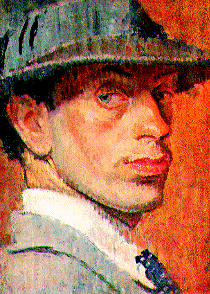 Isaac Rosenberg (1890-1918)
Isaac Rosenberg (1890-1918)
This self-portrait was done in 1915; it now hangs in the National Portrait Gallery, London.
Isaac Rosenberg was the least privileged of the British poets we are reading; he was born into a working-class Jewish family that had emigrated from Russia and eventually moved to the East End of London. Although his working-class origins and economic circumstances prevented him from attending Oxford or Cambridge, he was a talented artist and enrolled in evening classes in the Art School of Birkbeck College, London University. He hoped to make his living as a portrait artist and had moved to South Africa to pursue his career when the war broke out. He returned to England in 1915, enlisted in 1916 and was killed at the front on April 3, 1918.
Before going to the front he published a small volume of poems, Youth; both T. S. Eliot and Ezra Pound knew Rosenberg's poetry and admired it. Some critics suggest that, had he survived the war, he might have been an outstanding poet, equalling both Pound and Eliot in reputation. The voice of a "modern" poet is clearly heard, for example, in "God" and in his longer projected work Moses. The century was deprived of one of its most promising poets when he died in the Great War.